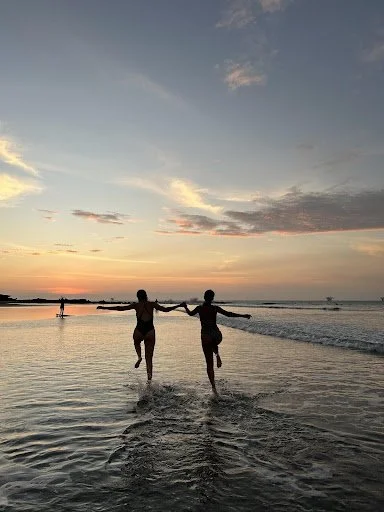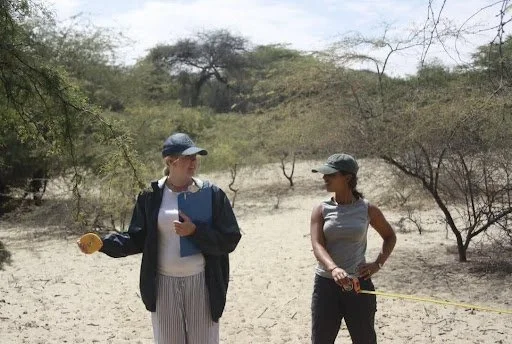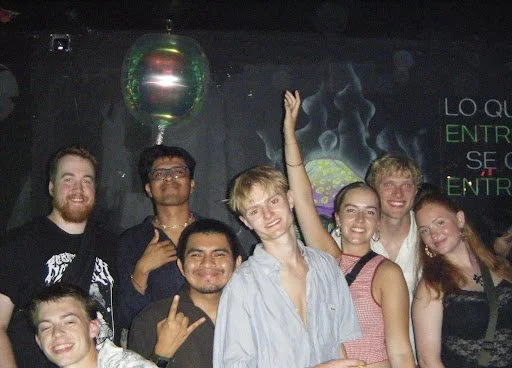Alicia’s Life as a Reforestation Intern with EcoSwell in Lobitos, Peru
I have really enjoyed my time as a Reforestation and Ecosystem Restoration Volunteer Intern here at EcoSwell. There are many responsibilities which we have, whether it be at the house, the reforestation site or in the local community. However we also have free time before and after work (and sometimes even at lunchtime!) to explore the local area and enjoy all of the many activities which Lobitos has to offer, such as surfing, horse-riding or yoga.
The EcoSwell Garden
Around the Ecoswell Garden, my teammate Ben and I have been germinating native species of Cotton, Faique, Algarrobo and Palo Negro from seeds. So far eight of them have sprouted! Everything in the garden gets regularly watered and its health and growth monitored. It was surprising to me how quickly I felt responsible for the plants’ wellbeing, and urged them to survive despite the regional aridity. For example, we dug divots around each plant, with the aim of increasing water infiltration by decreasing surface run-off: this also reduces the wastage of water. Furthermore, in EcoSwell’s Grey-Water Wetlands beside the kitchen, we planted more fresh vetiver plants, which are able to grow and treat the wastewater.
Our Reforestation Site
At the reforestation site, we are in the process of identifying each species which is growing alongside its co-ordinates, in order to create a map of this entire mini dry forest area. Each week we take compost (consistently harvested from kitchen waste or the dry toilet) and water to the site, completing a row at a time. We also build walls out of stones around each plant, protecting them from wind and minimising erosion, while creating a sunshade. The rows have become more sporadic as more plants have taken root organically (without planting by us) and the forest is becoming more dense on its own which is a good sign!
Planting Days in the Community
Wednesdays are planting day, where we arrange visits to local families and plant native species such as Algarrobo tree seedlings which are kept at the EcoSwell nursery. We show them how to care for their new garden additions with summary information sheets, spreading ecological education and awareness in a very engaging way with the community!
Ecotourism Trails and Educational Outreach
On a larger scale, I was tasked with systematising the maintenance needed on our ecotourism trail in Piedritas, where we walked the 5km route through wetlands, forest, viewpoints and birdwatching areas. This was important as ecotourism can help to boost the economy, such as by encouraging the locals to protect and conserve these biodiversity hotspots. For example, we joined a walking tour with Jeremy Flanagan in Talara, who showed us the local flora and fauna and described the many challenges faced by the ecosystem here, such as water stress, agricultural and urban expansion and Algarrobo Dieback (a plague called Enallodiplosis discordis). The Peruvian Plantcutter is a bird endemic to Northern Peru, whose habitat is threatened. Jeremy pointed some out, and we heard their bird call and saw them fly by. I even saw one living at the EcoSwell house! The children of the families on the trail with us were being taught all about the native plant species in this habitat, and were all refreshingly passionate to learn. We have also researched the many physical and mental benefits experienced just by being in nature during these immersive hikes.
Research
Some research done here included summarising the benefits of bird-watching and forest bathing, such as that spotting just 14 bird species equates to the feeling of receiving a $150 boost in income per month. I made this into an educational poster accessible for the families.
Sichez is a goat herding community near Lobitos which we visited to interview a local farmer, gathering information on the problems in the area, such as logging and water scarcity. I sadly did not get to see any goats, but we did see the ugliest turkey ever - we presumed it was an alien (jokes(!)).
I was also interviewed by a Research Volunteer Intern for her dissertation. She asked me about different methods of evaluating the success of the dry forest reforestation in Piedritas, and whether other volunteer interns would be willing and capable to learn how to carry them out. We tested the practicality of these on the trail, doing pilot studies by measuring Algarrobo abundance and analysing the forest ground surface.
Free time
In our free time, Lobitos has so many activities available. I volunteered for the weekly shop in Talara, exploring the food market and seeing Quenni (the EcoSwell House Administrator) in action. She has an amazing ability to choose the best local produce and seemingly knows every single seller there! It was mind-blowing to see firsthand how cohesive the community is. Plus, every single piece of fresh fruit or veg tastes better than it ever has in England too - the mangoes are absolutely delicious! My all-time favourites.
We had multiple surf lessons with Jhonny a surf instructor at La Punta, the main Lobitos surfspot on the beach. We then hired the board for our last weeks, where going from having never surfed before to being able to stand up on most waves was a huge improvement and such a fun challenge. There are also yoga classes, a gym, horse riding at sunset along the beach (a lot of people’s highlight!), a panoramic view of Lobitos from the water tower perched on the hills (this even beats the ocean view from the hostel of La Casona), karaoke in Sabai Sabai and many authentic and delicious food places - my favourite restaurant being El Ancla.
On one of my first days here, we joined all the locals for ‘Rock en el Rancho’, with a live band who were incredible and ate the BEST chocolate cake from the mysterious Carmen at Pepe’s (we only found out who this magical woman was in our last week - so of course we bought more cake to celebrate). We had a delicious group fajita night too, where most nights the interns cook for themselves or in groups which is good fun.
The people here are always in good spirits: even during a blackout we told ghost stories, did pictionary and stargazed. While having evacuated for a thankfully anticlimactic tsunami warning, we played games like mafia, cheat, and football. We played football with the local community too, and on two occasions Ben was told he was not allowed to leave the goal because he sorely lost rock, paper, scissors.
We had a weekend of visiting Máncora (a coastal town further North) and went to the markets, an iguana sanctuary and lots of bodysurfing on the waves before heading out for the evening. I had the best vegetable egg-fried rice ever (it’s called “chaufa” here)! Jesus, the EcoSwell Volunteer Coordinator, also hosted a Peruvian dance class for us, immersing in local Peruvian culture and learning some new skills.
In my last week we visited Las Capullanas beach with a hike to the caves at sunset. We also painted our names on rocks to revive the EcoSwell tradition, then went to enjoy our last evening on the beach playing three rounds of musical chairs in one of the beach hostels!
Overall, my professional experience here has been surrounded by social interactions, whether with other volunteer interns, or locals from the Lobitos community. The EcoSwell Directors encourage you to take a break from your work, to surf or go for a quick-dip in the ocean at lunchtime. Everyone here is knowledgeable and genuinely passionate about their work which is very inspiring. At the weekly meetings, each team does a summary of what they have been working on, and it is motivating to hear and see the long-lasting impact which EcoSwell has on the community, as well as on the volunteer interns. I have made so many new friends from around the globe in just four weeks, and would love to return to EcoSwell and support the organisation however I can. Being in Lobitos and then getting to travel Peru afterwards has been a dream come true.
Thank you EcoSwell! You will always be in my heart.








